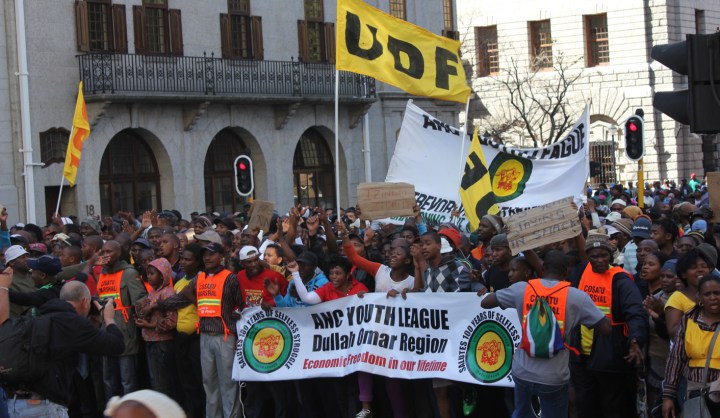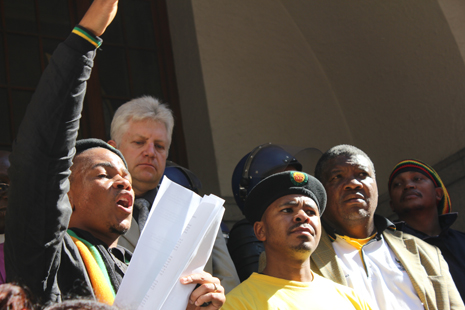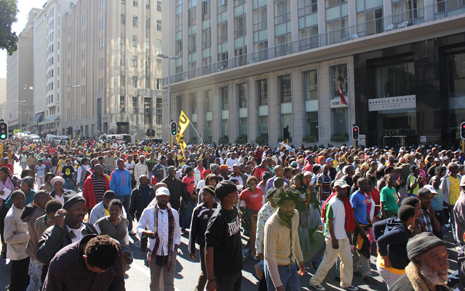South Africa
Western Cape: ANC Youth League beats a retreat – for now

ANC Youth League threats to shut down the Western Cape Monday proved to be mostly hot air, as only a fraction of the promised 10,000-strong crowd marched on the provincial legislature. A stalemate ensued when Premier Helen Zille refused to collect their memorandum without a public apology for threats of violence, and the crowd eventually dispersed unsatisfied. By REBECCA DAVIS.
The ANC Youth League claimed Monday would be a day to remember in the Western Cape. “We are officially declaring Monday a holiday for Western Cape’s citizens. No work as we make this city ungovernable,” Provincial Chairman Khaya Yozi announced last Thursday. A notification sent to Helen Zille informed her that the ANCYL would be marching with 10,000 people to hand over a memorandum of demands. “We request the Premier to receive the memorandum by herself and please not send us staff personnel,” it specified.
But Zille wasn’t budging so easily. In a response last Friday, she wrote: “I will accept your request if you publicly retract your repeated threats to make the city and the province ungovernable and apologise to the people of the Western Cape for the subsequent violent protests, which resulted in the tragic deaths of four people, numerous injuries and the destruction of public property.” To engage on the basis of threats, she maintained, would be “tantamount to endorsing the erosion of our constitution and the rule of law”.
It was a ballsy—and risky—position to take, given the spate of violent protests in the province over the past month. The Western Cape, jewel in the DA’s crown, has found itself suddenly to be in the media spotlight for service delivery protests many would associate more with failing provinces like Limpopo than the superficially high-functioning Cape. The problem, as always, is that of two Cape Towns: the well-resourced suburbs on the one hand and the informal settlements where more than 1-million people live, often without access to basic services, on the other.

Photo: Provincial ANC Youth League leaders Khaya Yozi and Loyiso Nkohla address the crowd outside the provincial legislature
While the past month’s protests may seem to have sprung out of nowhere in an unexpected outpouring of anger, they are actually a frequent occurrence within Cape Town’s informal settlements. It’s just that they don’t often get reported by mainstream media. “There’s really nothing out of the ordinary about service delivery protests in Khayelitsha,” Gavin Silber, policy coordinator of the Social Justice Coalition, told the Daily Maverick. “The City’s own research, conducted by market research company TNS, shows that Khayelitsha is the only district in the City where satisfaction levels with local government have decreased over the past five years.”
Silber said residents have reason to be unhappy. In a piece he wrote for GroundUp a fortnight ago, he described the discrepancy between qualities of life in the two Cape Towns: “In Cape Town today, a million people live in informal or inadequate housing on the city’s inhospitable periphery. At least half of these people have no access to basic sanitation facilities. Between 2002 and 2009 the number of city households in informal dwellings did not decrease—but increased by 100 000. Basic service provision to these communities is grossly inadequate due to lack of planning, monitoring and in some cases maladministration and corruption. Meanwhile, quality of life in the inner city and surrounding suburbs compares with the best-developed cities in the world.”
Part of the problem, Silber said, is that “we have a situation where we have one party running the city (DA) and one party running Khayelitsha (ANC). So the Mayor can just blame local councillors, and vice versa. Politics is getting in the way.”

Photo: Western Cape schoolchildren protest the proposed closure of their school
Helen Zille would no doubt agree. In the latest instalment of her newsletter, SA Today, she expressed clear frustration over the DA’s attempts to improve conditions within Cape Town’s informal settlements being stymied on a national level. “As urbanisation escalates and as more private land is ‘invaded’ (where the City is prevented by law from delivering services) the dissatisfaction grows, particularly during the Cape’s wet winters,” she wrote. “This is aggravated by the excessive red tape that has delayed the release of suitable state land for human settlement, by the national Department of Public Works.”
While Zille acknowledged there were “genuine grievances” about living conditions in Cape Town, she suggested the real motivation behind the current protests was the ANC Youth League’s jockeying for power. She claimed the Youth League was attempting to weaken both ANC provincial leadership and the DA-led government of the Western Cape by making the province “ungovernable”, rather than sincerely trying to represent the concerns of the poor.
This claim was repeated by Zille spokesman Zak Mbhele after Monday’s march. “The whole campaign is political grandstanding,” he told the Daily Maverick.
But Silber, of the Social Justice Coalition, said that to say the protests are either driven by genuine service delivery concerns or politically motivated is to draw a false dichotomy. Politicians opportunistically draw on existing anger, he said. “In informal settlements historically, there’s been a complex layer of local government structures that emerged out of necessity during Apartheid to fill a vacuum, featuring a lot of contestation for power between committees, councillors, etc. When it becomes clear that frustration is there, people use it to push their own agendas.”
In other words, Silber contends that while the ANC Youth League may be using service delivery issues as a platform for a political power play, there is little doubt that anger in this regard already exists and is merely being exploited.

Photo: Marchers leave the provincial legislature following Monday’s protest
The ANCYL had framed Monday’s march as being driven by three major concerns. Firstly, it called for the scrapping of the city’s proposed expansion of the Bus Rapid Transit scheme to Khayelitsha and Mitchells Plain, ostensibly pending “consultation with stakeholders”, but seemingly because they fear it could have a negative impact on the taxi industry. Secondly, it is opposed to the proposed closure of 27 schools in the province, which Western Cape MEC for Education Donald Grant stressed was not definite and to be decided after a period of consultation with, again, all stakeholders. Thirdly, broadly speaking, it called for better service delivery.
At the march itself, however, what came through most prominently was not one issue in particular, but rather a wider sense of injustice felt by participants. “The City works for the privileged, wake up Western Cape!” read one sign. “We are not criminals, we are hardworking Godfearing entrepreneurs!” said another. Neither was there any particular sense of a strong ANC Youth League loyalty at the event (though Julius Malema was duly Viva’d). In fact, the biggest cheers of the day were reserved for Cosatu’s provincial head, Tony Ehrenreich.
The mood in the city ahead of the march was tense, with fears that protestors would arrive armed and dangerous. A helicopter circled overhead, mounted policemen rode up and down the route, and a line of riot police stood ready in front of the march’s endpoint, the provincial legislature. (In a post-Marikana era, the advance police briefing must have been a serious task.)
The marchers flaunted regulations set by the City by setting off from Salt River Station, rather than the Keizersgracht in the CBD, an hour later than planned—prompting a series of irritated tweets from Zille. Nonetheless, probably prudently, the SAPS permitted the march to continue unmolested. Perhaps their leniency in this regard was also motivated by the realisation that the total crowd size was only about a tenth of that which had been promised: around a thousand people turned out. They marched behind an ANC Youth League banner, but the usual broad church of organisations was represented, at least in T-shirt form: the UDF and Cosatu both had large delegations.
Youth League organisers Khaya Yozi and Loyiso Nkohla seemed conscious of the need to keep the march orderly, communicating frequently with police and calming the crowd at various points. It was unclear whether Yozi and Nkohla actually expected Zille to back down from her word and accept their memorandum outside the legislature, but the crowd certainly did. News that Zille would not be coming out was greeted by chants of “Zille, Zille” and yells of “We want the madam!”
Zille herself was overwhelmingly the target for the brunt of the crowd’s hostility. One sign said: “Go back to Judah Zille”; another read, intriguingly, “Zille gaan terug na jou land Germany” (Zille go back to your country Germany). At one point a man in the crowd shouted: “Where were you born, Zille?” Though Zille’s parents were German, she was born in Johannesburg. (Will Zille eventually be forced, like Obama, to produce her birth certificate?)
ANC Youth League spokeswoman Magdalene Moonsamy took the Zille-bashing to a new level when she told the crowd that “We are going to charge Helen Zille with genocide in the Western Cape”. (In response to this, Mbhele told the Daily Maverick after the march: “Magdalene Moonsamy needs to look up the word ‘genocide’.”)
Is it disturbing to Zille to receive such personally-directed anger? “What was disturbing was the undemocratic and violent language mixed in with personal insults, and the talk of the government as the enemy when it is democratically-elected,” Mbhele replied. “Direct threats to the constitution are the real problem, and reveal the real face of the Youth League.”
It was not only the Youth League using violent rhetoric, however. Monwabisi Luthuli, Western Cape provincial secretary for the South African Student’s Association (Sasco) urged the crowd to “make sure we bring down the leadership of Zille. You must destroy everything that is blue, yellow and white.” Manenberg activist Mario Wanza called for another attempt to claim Rondebosch Common: “We want our mountain back,” he said. “We want our land back,” to tumultuous cheers.
Ultimately, however, there was little the organisers could do in the face of Zille’s cold shoulder. Deputy Federal DA Chairman Ivan Meyer was initially sent out to receive the memorandum (did the DA top brass play rock-paper-scissors to decide who would be dispatched?) but was soundly booed by the crowd and retreated. In the end the memorandum was received by DA Finance Minister Alan Winde, who was again greeted by boos. Initially the marchers resolved to stay around until Zille cracked. After an hour or so under an unseasonably hot sun, however, many began to sit or lie down on the road, and eventually the order was given to leave. The exit was undertaken peacefully.
The Youth League made it clear, however, that it will be protesting on the 27th of every month until its demands are met. It was also adamant that Zille will not get the public apology she demands. Mbhele was equally steadfast, however, that Zille will never appear before them to receive their petitions until the apology was received. The bottom line for the DA, he said, was that the provincial departments are “firing at full throttle to deliver services as efficiently as possibly, and the claims made about service delivery have no grounds in truth”.
From the looks of things, that line is unlikely to appease many. “We are sitting on a bit of a time-bomb,” Silber warned. “It’s unimaginable to think this situation can exist in perpetuity, unless we do something to bridge the two cities existing into one.” DM
Read more:
- ANCYL call on ‘madam’ Zille to receive memorandum, in M&G
- Why Cape Town has erupted and what we can do about it, on GroundUp
Main photo: Protestors gather outside the Western Cape provincial legislature on Monday

















 Become an Insider
Become an Insider